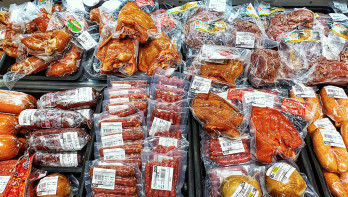Analysis Meat
Relief as British controls go smoothly
Since May 1st, exports to the British market are officially subject to entry controls. On the eve of those controls, the Central Organization for the Meat Sector (COV) expressed concern that the United Kingdom would not yet be able to carry out large-scale inspections. The main concern in the market was that meat would spoil due to long waiting times. In practice, the situation is not as bad as feared.
For the past three months, meat exports to the United Kingdom have already been inspected. However, that period was considered a transitional period. Incorrect transports were still allowed. The exporter in question was not punished but could count on advice. At least, that was the idea.
Tolerance policy
Since May, the transitional period has ended. Meanwhile, the majority of exports are going smoothly. However, there are reports in the market that the export of meat from third countries still causes problems. Exporters indicate that there are still problems on the Dutch side as well. According to them, the Dutch Food and Consumer Product Safety Authority (NVWA) has not yet properly arranged the certificates for importing products from outside Europe into the UK. They have little understanding for this, as the British Department for Environment, Food & Rural Affairs (DEFRA) indicates that imports from third countries are allowed.
So far, the situation has not caused problems. It is heard in the market that no transports are being refused yet. British inspectors reportedly still allow exports with incorrect certificates and even exports without certificates to continue. Although there is a strong need for clarity in the market, the fear that the transit of products from third countries will stagnate has largely subsided. There is now confidence that the British will not impede imports.
Focus on the impossible
The COV recognizes the situation but nuances the story somewhat. According to policy expert Ruben van Rooij, it is too simplistic to blame the NVWA entirely. Van Rooij explains that the NVWA still has outstanding questions for DEFRA and has been waiting for answers for months.
However, the NVWA is not completely blameless. "The NVWA only focuses on what is not possible and refuses to consider what is already possible," says Van Rooij. The organization seems afraid to sign a document when not all rules are known. This makes the authority partly responsible if mistakes are made and shipments are still refused.
Feedback
The British authorities are also not exempt from criticism. According to Van Rooij, British inspectors initially provided feedback in very general terms. Exporters did not receive notifications of individual errors. Instead, DEFRA shared the most common mistakes. Van Rooij notes that the British ministry now points out individual errors, although it is rather late now that the transitional period is over. Companies are therefore dependent on the goodwill of the British government. Van Rooij does not expect trucks to be sent back quickly. "Fortunately, the British are taking a pragmatic approach."



